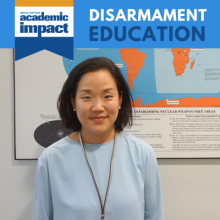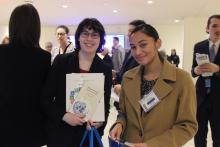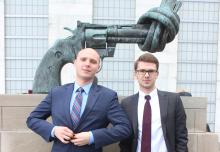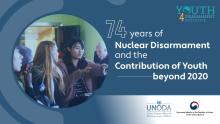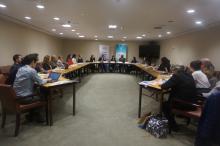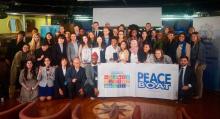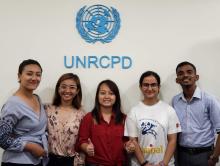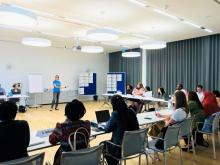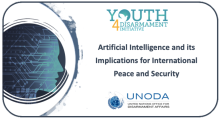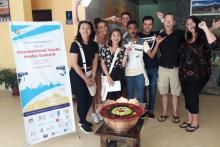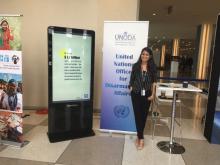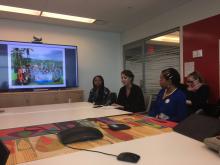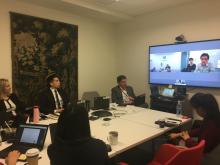On 19 February, the UN Office for Disarmament Affairs’ (UNODA) flagship youth outreach programme, Youth4Disarmament, advanced two youth consultations to inform the Second Independent Progress Study on Youth, Peace and Security (YPS). The global consultation hosted by UNODA and the regional consultation hosted by the United Nations Regional Centre for Peace, Disarmament and Development in Latin America and the Caribbean (UNLIREC) both provided youth leaders with opportunities to make their voices heard on topics in youth and disarmament.
OUR WORK
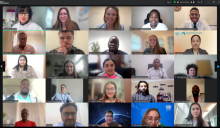
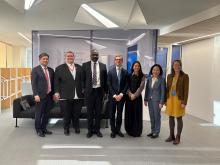
On 11 December, the United Nations Office for Disarmament Affairs (UNODA), together with the Permanent Missions of the Republic of Korea and Finland, co-hosted the event “Youth at the Nexus of Peace, Security and Disarmament: From Outcome to Action” in commemoration of the10th anniversary of the UN Security Council Resolution 2250, on Youth Peace and Security (YPS) and the 6th anniversary of the General Assembly Resolution 74/64 on Youth, Disarmament and Non-proliferation.
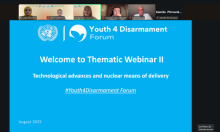
On August 19th 2025, the third and final Youth4Disarmament (Y4D) Forum preparatory webinar engaged participants in the ever-complex challenge of managing the impact of technological developments on evolving nuclear weapons delivery systems.
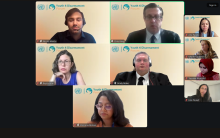
25 July 2025 — The second UN Youth4Disarmament Forum webinar plunged young leaders into one of today’s most complex security puzzles: the growing convergence between nuclear weapons, artificial intelligence (AI), and the cyber domain.
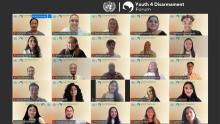
The United Nations Office for Disarmament Affairs (UNODA) kicked off the Youth4Disarmament Forum initiative with an introduction webinar on 24 June 2025. The session aimed to create a dynamic platform for discussion on nuclear risks, technological evolution, and the role of youth in shaping disarmament diplomacy, bringing together young advocates and experts in the field. The session marked the continuation of UNODA’s work to promote meaningful youth participation towards action and innovation driven multilateralism.
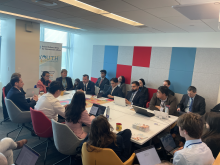
The UN Office for Disarmament Affairs (UNODA) organized a ECOSOC Youth Forum side event on “The Impact of the Global Increase in Military Expenditure on the Achievement of the Sustainable Development Goals” on April 15, 2025. Young people from around the world came together to discuss the increase in military spending and to reflect on its implications for their lives, communities, and the future they envision.
The panel of speakers consisted of:
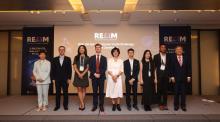
Young voices broke through typical policy discussions during the youth side-event of the 2024 Responsible AI in the Military Domain (REAIM) Summit in Seoul, Republic of Korea (ROK), offering fresh insights into the future of artificial intelligence in the military domain. Winners of the ROK-UN Sci-fAI Futures Youth Challenge sparked meaningful conversations about how AI could reshape warfare by 2145.

On 15 July, in celebration of World Youth Skills Day, the United Nations Office for Disarmament Affairs (UNODA) hosted the Regional Youth Forum, which included 3 different regional sessions with youth from Asia and the Pacific, Africa and Europe, and the Americas. Throughout the event, the UN Youth Champions for Disarmament (YC4D) presented their regional priorities for disarmament and their projects to engage local communities on issues, before gathering insights and recommendations from participants to be collated and presented at the UN General Assembly’s First Committee in October 2024.
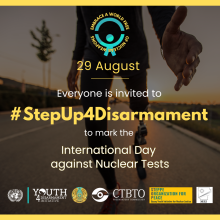
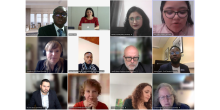
On 2 May, Her Excellency Ms. Maritza Chan Valverde, Permanent Representative of Costa Rica to the United Nations, who also serves as the President Designate of the Fourth Review Conference (RevCon4) of the United Nations Programme of Action to Prevent, Combat and Eradicate the Illicit Trade in Small Arms and Light Weapons in All Its Aspects (UN PoA), hosted a virtual consultation with Non-Governmental Organizations (NGOs) ahead of RevCon4.
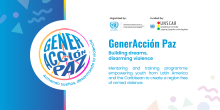
On 24 April 2024, on the International Day of Multilateralism and Diplomacy for Peace and Spanish Language Day, UNLIREC launches the first edition of GenerAcción Paz: building dreams, disarming violence, aiming at empowering young people to create a region free of armed violence.
The call is aimed at Spanish speakers between 18 and 29 living in Latin America and the Caribbean. Young people from diverse academic or professional backgrounds are invited to apply. 10 standout participants will be selected based on their active participation in youth networks, their organizational and leadership skills, as well as their interests and initiatives to promote a region free of armed violence.
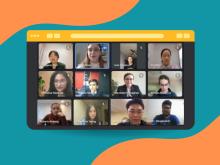
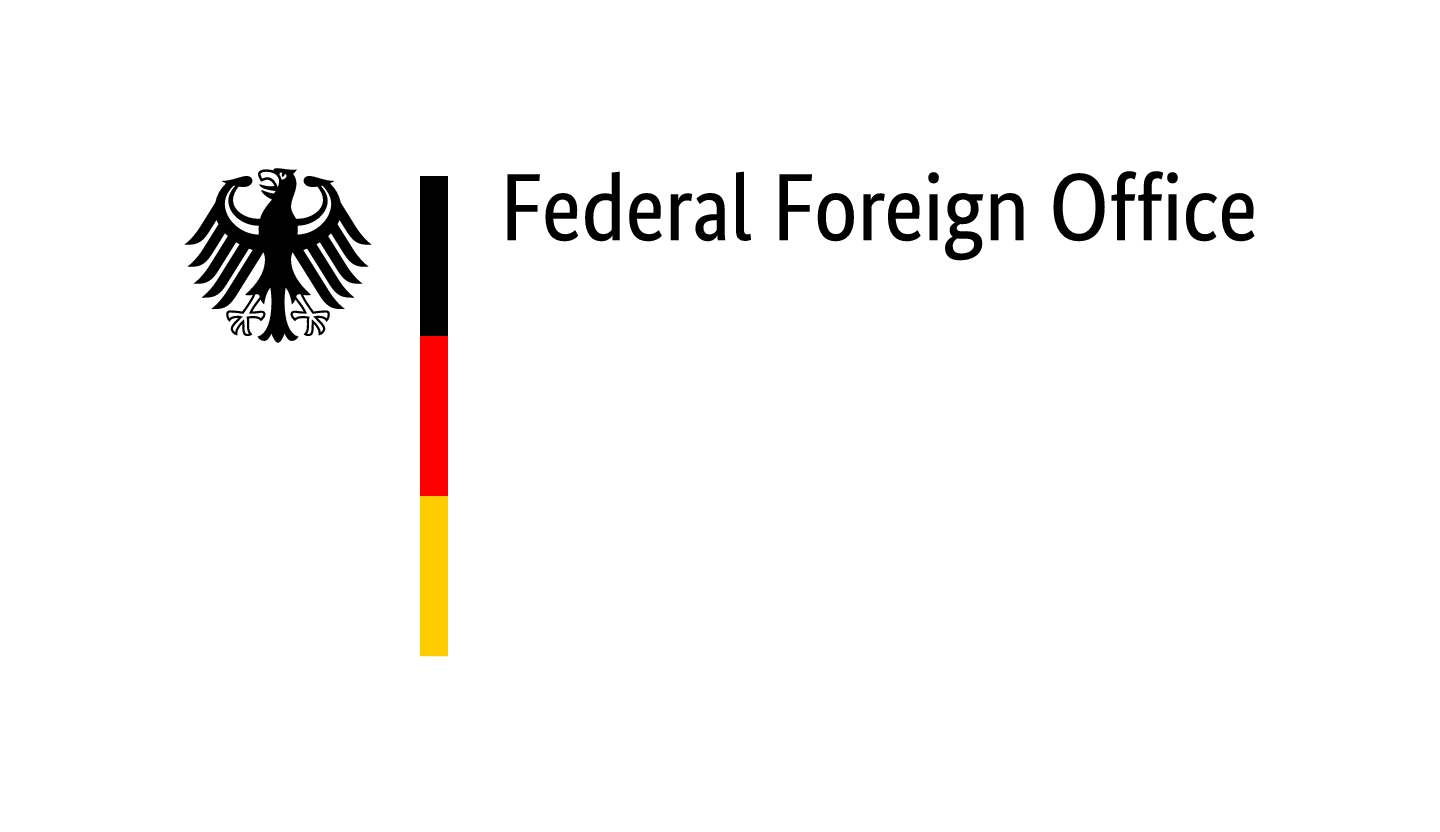 On 20 February 2024, the UN Youth Champions for Disarmament met for the first-time in a virtual orientation session.
On 20 February 2024, the UN Youth Champions for Disarmament met for the first-time in a virtual orientation session.
The Youth Champions brought with them their diverse backgrounds, interests and perspectives and engaged in an interactive and enthusiastic discussion on their motivations for applying for the programme.
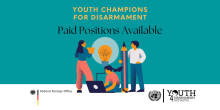
In addition to the call for applications to the UN Youth Champions for Disarmament Training Programme, the United Nations Office for Disarmament Affairs is creating three job opportunities for young professionals in its regional centres and offices to support the programme implementation at regional levels.
To learn more and apply for the Junior Project Advisor positions, please see below:
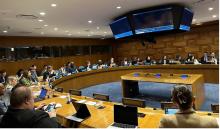
On 23 October, Mr. Adedeji Ebo, Director and Deputy to the High Representative for Disarmament Affairs, and H.E. Mr. Sangjin KIM, Deputy Permanent Representative of the Republic of Korea to the United Nations, joined a group of the #Leaders2Future in a side event of the United Nations General Assembly First Committee to share insights on the role of young people in advancing disarmament, non-proliferation, and arms control objectives. Ms. Soo Hyun Kim, Political Affairs Officer and Youth4Disarmament lead with the United Nations Office for Disarmament Affairs (ODA), and Ms. Marykate Monaghan, #Leaders2Future project lead, moderated the event.
United Nations Secretary-General António Guterres has made a major push to engage and empower young people, recognizing their participation as essential for identifying new solutions that will secure the breakthroughs that our world urgently needs.
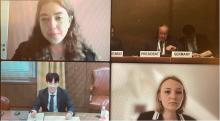
On 10 August 2023, five young leaders participated in a panel discussion held by the Conference on Disarmament facilitated by UN Office for Disarmament Affairs (ODA) to share their views on the Cessation of the nuclear arms race and nuclear disarmament (agenda item 1) as well as on the Prevention of nuclear war, including all related matters (agenda item 2).
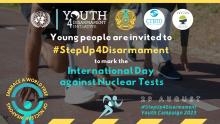
The #StepUp4Disarmament Youth Campaign is back for the third year running!
Building on the success of the two previous campaigns conducted in 2021 and 2022, the Office for Disarmament Affairs’ #Youth4Disarmament initiative and collaborating partners are calling on young people to #StepUp4Disarmament by either completing a distance of 8.29 kilometres or tracking 10.9k steps, an approximate equivalent, to mark the International Day against Nuclear Tests, on 29 August 2023.
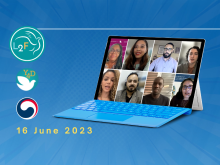
For the sixth session of the Leaders to the Future Series, a group of young leaders joined together online to learn about approaches to strengthen inclusion and diversity within the disarmament field. The workshop took place on Friday 16 June, in commemoration of the International Day for Countering Hate Speech on 18 June.
The annual International Day highlights how the impact of hate speech cuts across numerous UN areas of focus, from protecting human rights and preventing atrocities, to sustaining peace, achieving gender equality, and supporting children and youth.
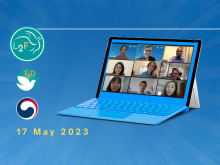
On Wednesday 17 May, the Leaders to the Future gathered online to learn about the potential opportunities and challenges posed by new and emerging technologies to mark World Telecommunication and Information Society Day.
The annual International Day provides an opportunity to discuss the advantages of using the internet and other information and communication technologies (ICTs) to build more sustainable societies, as well as the need to address and manage the potential challenges posed by emerging technologies.

On 27 April 2023, the UN Office for Disarmament Affairs (UNODA) convened a panel comprised of UN Youth Champions for Disarmament, Member State representatives, researchers and civil society as part of its event entitled “Disarmament for Development: Rebalancing Military Expenditure with Development Priorities.”
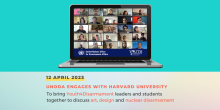
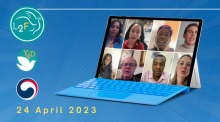
On Monday 24 April, the Leaders to the Future gathered for a virtual workshop on the role of multilateralism in the field of disarmament, non-proliferation, and arms control to mark the International Day of Multilateralism and Diplomacy for Peace.
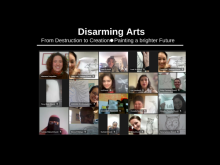
On Friday 14 April, the United Nations Office for Disarmament Affairs’ (ODA) #Youth4Disarmament Initiative co-facilitated a creative session with IM Swedish Development Partner’s Humanium Metal a non-profit organization that transforms seized firearms into non-lethal commodities for peace, such as buttons, spoons, watches and crayons. The session was moderated by Marianna Campaldini, Humanium Metal Intern, and Lumnije Maksuti, Humanium Metal Fellow.
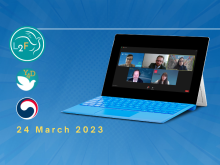
Ahead of the 2024 Summit of the Future, the United Nations Office for Disarmament Affairs (UNODA) and the United Nations Office of Outer Space Affairs (UNOOSA) organized an online youth consultation on topics related to the peaceful uses of outer space.
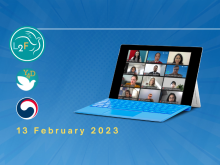
On Monday 13 February 2023, a group of 39 young leaders, from around the world, gathered to discuss the importance of gender parity in disarmament, non-proliferation, and arms control (D.N.A.) in the second session of the “Leaders to the Future” series to mark the International Day of Women and Girls in Science on 11 February.
With generous financial support from the Ministry of Foreign Affairs of the Republic of Korea, the online workshop series will engage the alumni members of the #Youth4Disarmament initiative on linkages between D.N.A. and numerous topics related to international peace and security.
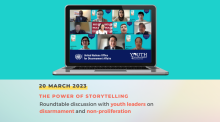
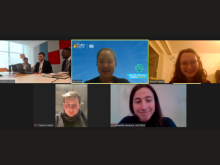
On Thursday 9 February 2023, staff members from the United Nations Office for Disarmament Affairs (UNODA) met with a group of UN Youth Delegates to discuss the work of the United Nations and ways to engage young people on issues related to disarmament, non-proliferation, and arms control.
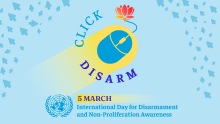
To commemorate and countdown to the International Day for Disarmament and Non-Proliferation Awareness on 5 March, the #Youth4Disarmament initiative has launched the #ClickDISARM campaign.
As part of the activity, various features of the #Youth4Disarmament website will be highlighted to raise awareness on the opportunities provided to engage, educate, and empower young people on disarmament, using each letter of “DISARM” to spotlight the different avenues to:
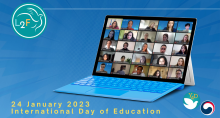
On 24 January, the International Day of Education, 46 young participants from around the world attended an interactive webinar to share and present their ideas to support the development of the Secretary-General's New Agenda for Peace, organized by the United Nations Office for Disarmament Affairs (UNODA). During the session, the participants discussed, developed, and presented their bold and fresh thoughts and ideas on how they see the future of disarmament.
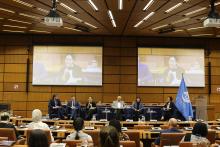
On 9 December 2022, Ms. Soo Hyun Kim, the United Nations Office for Disarmament Affairs' #Youth4Disarmament lead, participated in a panel discussion on ways "towards a nuclear-test-free future: insights from and for the next generation".
The panel formed part of the third Comprehensive Nuclear-Test-Ban Treaty (CTBT) Science Diplomacy Symposium, bringing visionary thinkers from different backgrounds together to share their ideas for a more desirable future.
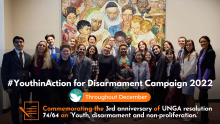
To mark the 3rd anniversary of UN resolution 74/64, the first on Youth, Disarmament and Non-Proliferation, the #Youth4Disarmament initiative has launched the 2022 edition of the #YouthInAction for Disarmament Campaign.
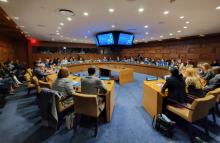
On 19 October 2022, the #Leaders4Tomorrow presented twenty-three projects to engage youth on topics related to disarmament, non-proliferation, and arms control (D.N.A.) in a sideevent of the United Nations General Assembly. Ms. Soo Hyun Kim, #Youth4Disarmament lead with the United Nations Office for Disarmament Affairs (UNODA), moderated the event.
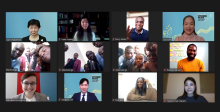
Inspired by the healing and uniting power of music, the United Nations Office for Disarmament Affairs launched the Pitching Peace Youth Music Challenge. Young people aged between 13-29 years old were invited to share their passion for peace by composing and recording their own musical entries.
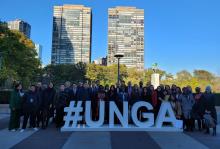
On 20 October 2022, 22 of the #Leaders4Tomorrow gathered with the United Nations Disarmament Fellows to exchange perspectives on topics related to disarmament, non-proliferation, and arms control.
During the in-person session, the two cohorts discussed ways to engage youth in disarmament, provide entry points into the disarmament field, and exchange perspectives on current challenges related to international peace and security.
Ms. Soo Hyun Kim, #Youth4Disarmament Lead, and Mr. Peter Kolarov, Disarmament Fellows Coordinator, facilitated the session.
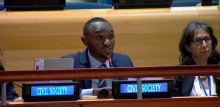
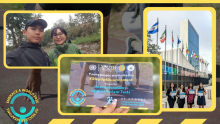
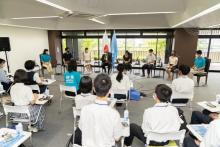
On 6 August 2022, the seventy-seventh anniversary of the atomic bombing of Hiroshima, the UN Secretary-General António Guterres met with youth leaders to hear their innovative ideas and perspectives for advancing nuclear disarmament and non-proliferation.
Six young activists from Japan spoke with the Secretary-General about their experiences working in the field of disarmament, current obstacles for achieving a world free of nuclear weapons and the role of young people as the ultimate force for change.
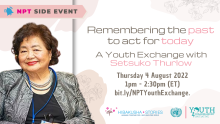
As we approach the 77th anniversary of the atomic bombings of Hiroshima and Nagasaki, the opportunities to hear first-hand testimony from the survivors - the Hibakusha - become fewer and fewer. With time marching on, it is imperative to engage and educate the next generation on the stories of the Hibakusha - to preserve their memories and to take on their goal of achieving a world free of nuclear weapons.
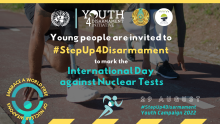
#StepUp4Disarmament is back!
Following the success of last year’s initiative, #Youth4Disarmament and its collaborating partners are calling on young people to #StepUp4Disarmament by either completing a distance of 8.29 kilometres or tracking 10.9k steps, an approximate equivalent, to raise awareness of the International Day against Nuclear Tests, on 29 August 2022, and its cause to ban nuclear tests.
The campaign aims to raise awareness of the devastating health consequences of nuclear testing through an emphasis on physical activity, recognizing that sport plays a crucial role for many young people across the world.
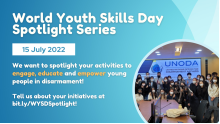
To commemorate World Youth Skills Day 2022, #Youth4Disarmament will highlight youth-led activities to engage, educate and empower young people in disarmament.
Young advocates, leaders and practitioners are invited to provide information on events and initiatives conducted to engage youth and what inspired them to act by filling out the dedicated webform.

The United Nations Office for Disarmament Affairs has opened for applications a number of internship opportunities below.
For information on how to apply, go to the Application Process page. To read about recent changes to the application process, click here. More information is available on how to create your application and the UN Internship Programme.

On 11 May 2022, staff members from the United Nations Office for Disarmament Affairs (UNODA) met with students from Falu Frigymnasium, a school based in Sweden, to discuss the work of the United Nations and ways for young people to get involved in the disarmament field.
The briefing formed part of the group’s in-person study trip to the United Nations headquarters in New York.
Students met with Ms. Soo Hyun Kim, Acting Director of the UN Regional Centre for Peace and Disarmament in Asia and the Pacific & #Youth4Disarmament Lead, Ms. Claudia Garcia Guiza, Political Affairs Officer, and Ms. Frida Thomassen, Associate Political Affairs Officer.
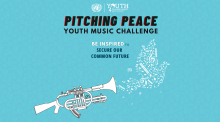
On 24 May 2018, the United Nations Secretary-General published his Agenda for Disarmament, aiming to set our world on a path towards sustainable peace and security for all. To mark the fourth anniversary of Securing Our Common Future, the United Nations Office for Disarmament Affairs is launching the Pitching Peace Youth Music Challenge, inviting young people to express their passion for peace through music.
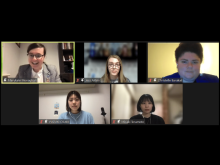
On 30 April 2022, five representatives of the #Youth4Disarmament initiative participated in a panel discussion to highlight how the United Nations is engaging, educating, and empowering young people in building a better and safer future for all.
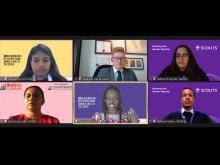
On 19 April 2022, UN Youth Champion for Disarmament, Naomi Ekpoki, participated in the SDG 5 Thematic Session on “Generation Equality: Building Back Better with Young Women and Girls at the Centre”.
The session formed part of the 2022 ECOSOC Youth Forum, which this year addressed the theme of “Building back better from COVID- 19 while advancing the full implementation of the 2030 Agenda.” As an annual initiative, the ECOSOC Youth Forum provides a key platform for young people to contribute to policy discussions at the United Nations through their collective ideas, solutions, and innovations.
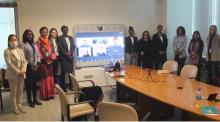
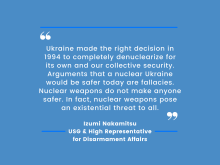
The High Representative for Disarmament Affairs, Ms. Izumi Nakamitsu, provided the following comments on her Twitter page.
Ukraine made the right decision in 1994 to completely denuclearize for its own & our collective security. Arguments that a nuclear Ukraine would be safer today are fallacies. Nuclear weapons do not make anyone safer. In fact, nuclear weapons pose an existential threat to all.
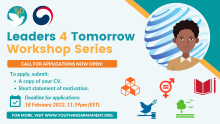
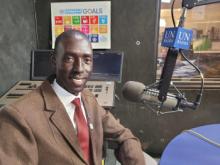
Ms. Soo Hyun Kim, a Political Affairs Officer leading Youth for Disarmament Initiative in the United Nations Office for Disarmament Affairs (UNODA) is joined by two special guests Jok Abraham Thon from South Sudan and Gail Prensky from Washington D.C. sharing their stories of making an impact in the world by changing minds from “bullets to books”.
This podcast is being released during the annual 16 Days of Activism Against Gender-Based Violence Campaign. This year’s theme is “Be the Change”, aiming to inspire people to make a difference in their communities.

The United Nations General Assembly declared 2021 the “International Year of Peace and Trust”. It is also the first year of the Decade of Action to usher in ambitious steps to deliver on the 2030 Agenda for Sustainable Development. Against this backdrop, the Office for Disarmament Affairs is launching the “What if — Spesterra” Youth Video Challenge to stimulate young people’s interest and knowledge about the vital way disarmament contributes to a safer, more secure and sustainable world for all. The challenge was launched on World Arts Day, on 15 April 2021, and closed for submissions on International Youth Day, 12 August 2021.
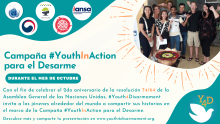
Con el fin de celebrar el 2do aniversario de la resolución 74/64 de la ONU , la primera resolución sobre la Juventud, el Desarme y la No Proliferación, la iniciativa #Youth4Disarmament ha lanzado la Campaña #YouthInAction para el Desarme con el apoyo de los siguientes socios colaboradores: la Misión Permanente de la República de Corea ante las Naciones Unidas, Reverse the Trend, Youth Fusion, y la Red Internacional de Acción Contra las Armas Ligeras (IANSA).
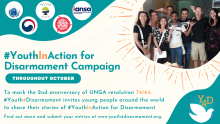
To mark the 2nd anniversary of UN resolution 74/64, the first on Youth, Disarmament and Non-Proliferation, the #Youth4Disarmament initiative has launched the #YouthInAction for Disarmament Campaign with support from collaborating partners the Permanent Mission of the Republic of Korea to the United Nations, Reverse the Trend, Youth Fusion, and the International Action Network on Small Arms (IANSA).
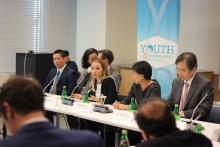
On 22 September 2021, the #Youth4Disarmament Team discussed youth engagement in disarmament with the students of Dr. Matthew Bolton, Director of International Disarmament Institute of Pace University, during a virtual seminar.
Ms. Soo Hyun Kim, Political Affairs Officer, and Ms. Marykate Monaghan, Youth Outreach Consultant, spoke with undergraduate students about the approaches, activities and projects of the #Youth4Disarmament initiative.
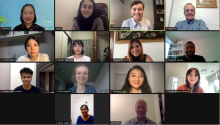
On 21 September 2021, the #Youth4Disarmament initiative held a virtual workshop with entrants of the “What If - Spesterra” Youth Video Challenge to mark the International Day of Peace.
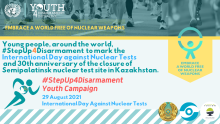
On 29 August 2021, young people from around the world participated in the #StepUp4Disarmament Youth Campaign to commemorate the International Day Against Nuclear Tests and the 30th anniversary of the closure of the Semipalatinsk nuclear test site in Kazakhstan.
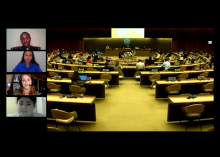
On 12 August 2021, International Youth Day, UN Youth Champions for Disarmament delivered remarks to the formal plenary of the Conference on Disarmament during a dedicated session on Youth and Disarmament.
The dedicated session on youth and disarmament marks a significant milestone, inviting youth voices into the Conference on Disarmament’s discussions for the first time. The plenary meeting was a joint effort by Canada as the President of the Conference on Disarmament and its Member States to facilitate inclusive and meaningful participation of youth in inter-governmental processes.
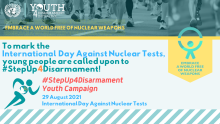
This year marks the 30th anniversary of the closure of the Semipalatinsk nuclear test site on August 29, 1991. On 2 December 2009, the 64th session of the United Nations General Assembly declared 29 August the International Day against Nuclear Tests by unanimously adopting resolution 64/35.
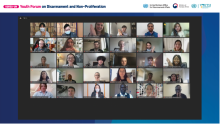
On 30 June 2021, the participants of the Youth Forum on Disarmament and Non-Proliferation adopted the Seoul Youth Declaration for Disarmament and Non-Proliferation, containing their recommendations for Securing Our Common Future.
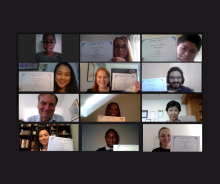
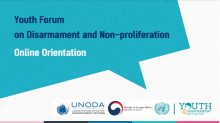
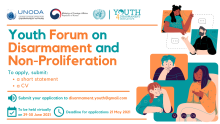
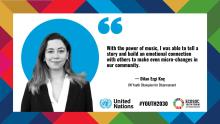
On 8 April 2021, UN Youth Champion for Disarmament Dilan Ezgi Koç delivered remarks at the Economic and Social Council (ECOSOC) Youth Forum.
The ECOSOC Youth Forum forms a unique platform for young people, Member States and partners to discuss the issues most important to young people today and for youth to share their vision and actions on implementing the Sustainable Development Goals (SDGs) by 2030.
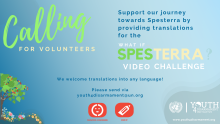

Tuesday, March 23rd, will mark the 1-year anniversary of UN Secretary-General António Guterres’ appeal for a global ceasefire. This presents a moment to take stock of where we are and what is needed to promote peace, security and development and a better world for all.

The newsletter highlights a collection of materials produced by the #Youth4Disarmament initiative and the United Nations Office for Disarmament Affairs over the past few months to promote meaningful and inclusive participation and empowerment of youth on disarmament and non-proliferation issues. This includes spotlight stories produced by our #Youth4Disarmament members, the latest updates from our Youth Champions for Disarmament and information on the events that have taken place over the fall and winter period.
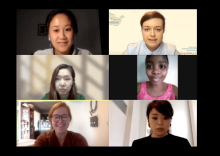
In the latest UNODA Disarmament Today podcast, we are celebrating and commemorating a range of milestones that have both advanced the role of young people in disarmament, and opened opportunities for the youth to make meaningful contributions within the field.
Ms. Marykate Monaghan, an intern with the United Nations Office for Disarmament Affairs (UNODA), talks to five youth leaders from a range of different projects and initiatives, working with other young people to act as “the ultimate force for change.” They discuss the steps that they are taking to contribute to disarmament around the globe, and tips, suggestions, and resources for interested listeners to get involved themselves.
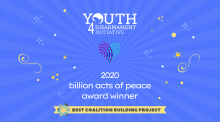
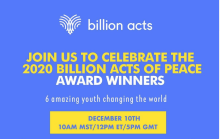
The #Youth4Disarmament Initiative has been nominated as one of twelve semi-finalists for a 2020 Billion Acts of Peace Award from more than 8 Million Acts of Peace worldwide for its efforts to engage, educate and empower young people to address international security challenges. Billion Acts of Peace, an initiative of the PeaceJam Foundation, is a global movement led by 14 Nobel Peace Prize Winners and youth around the world with the ambitious goal of creating One Billion Acts of Peace by 2021.
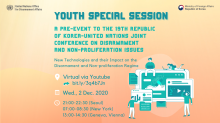

The United Nations Office for Disarmament Affairs has advertised the internship opportunities below for New York, Geneva and Vienna.
For information on how to apply, go to the Application Process page. To read about recent changes to the application process, click here.
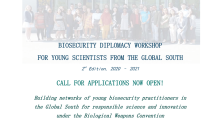
The Implementation Support Unit (ISU) of the Biological Weapons Convention (BWC) and the United Nations Office for Disarmament Affairs (UNODA) are delighted to open the call for applications to the 2020 – 2021 Biosecurity Diplomacy Workshop for Young Scientists from the Global South. Due to the COVID-19 pandemic, this 2nd Edition will mainly be held virtually between end November 2020 and mid-2021.
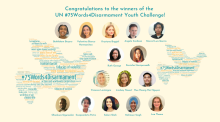
Disarmament is at the heart of the collective security system set out in the United Nations Charter, with its goal to “save succeeding generations from the scourge of war”. In commemoration of the seventy-fifth anniversaries of the establishment of the United Nations and the atomic bombings of Hiroshima and Nagasaki, the Office for Disarmament Affairs held the “75 Words for Disarmament Youth Challenge”, which was launched on 12 August, International Youth Day, and was closed on 26 September, the International Day for the Total Elimination of Nuclear Weapons.
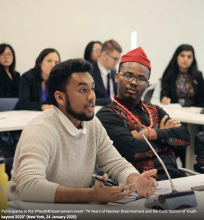
Today, the #Youth4Disarmament Initiative was featured in the UN Secretary-General’s Annual Report on the Work of the Organisation 2020! The report referred to the initiative’s work in empowering young people with the knowledge, skills and opportunities to act as a force for change.
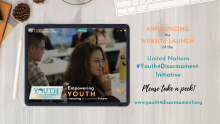
Disarmament is at the heart of the collective security system set out in the Charter of the United Nations, with its goal to “save succeeding generations from the scourge of war”.
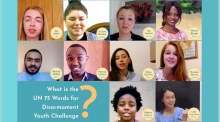
Disarmament is at the heart of the collective security system set out in the United Nations Charter, with its goal to “save succeeding generations from the scourge of war”. In commemoration of the seventy-fifth anniversaries of the establishment of the United Nations and the atomic bombings of Hiroshima and Nagasaki, the Office for Disarmament Affairs is launching the “75 Words for Disarmament Youth Challenge”.
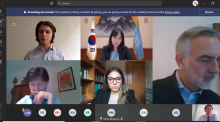
Today, we served as strong witnesses of the amazing work UNODA is doing to engage more youth in disarmament activities. We were really honoured to have been specially recognised and mentioned as the first group of 10 UN Youth Champions for Disarmament by the High Representative for Disarmament Affairs, Ms. Izumi Nakamitsu as she commenced her opening speech at the high level event “The Tenth NPT Review Conference: Youth and the NPT”. This gesture was definitely very encouraging for the entire group to receive such a special welcome at this prestigious event, it also shows that youth are making headway in being part of global decision making with regards to disarmament; this for us is an achievement for the youthful population.
Since its founding, the United Nations has given the highest priority to reducing and eventually eliminating weapons of mass destruction, including nuclear, biological and chemical weapons, as well as controlling small arms and light weapons. With the rapid development of information and communications technology, the emergence of new concepts of security and threat, and the largest generation of young people in history, the need for education in disarmament and non-proliferation has never been greater.
On 28 February 2020, scholars, disarmament experts, educators, young students and human rights activists gathered at the United Nations in New York to discuss one central question: “What can we do to make wars come to an end?” This year’s Committee on Teaching About the United Nations (CTAUN) Conference, co-sponsored by the Permanent Mission of the Republic of Korea to the United Nations, was entitled “WarNoMore”, honouring the 75th anniversary of the United Nations and its purpose as outlined in the Charter: “We the Peoples of the United Nations determined to save succeeding generations from the scourge of war.”
Education is a crucial element of the global disarmament process, and that is why it is important for the United Nations Office for Disarmament Affairs (UNODA) to support the next generation of leaders in this field through the UN’s internship programme. This is in line with the 2002 UN Study on Disarmament and Non-proliferation Education (A/57/124) which identified the objective to impart knowledge and skills to individuals to empower them to make their contribution, as national and world citizens, to the achievement of concrete disarmament and non-proliferation measures and the ultimate goal of general and complete disarmament under effective international control.
The United Nations Office for Disarmament Affairs (ODA) engaged approximately seventy young people in a wide-ranging discussion on youth action for disarmament to mark the 74th anniversary of the first UN General Assembly resolution, which established the goal of eliminating nuclear weapons and all other weapons of mass destruction. The event was organized with the support from the Permanent Mission of the Republic of Korea to the United Nations.
How can disarmament contribute to saving lives? What are innovative solutions to break the cycle of armed violence? How does disarmament contribute to achieving the Sustainable Development Goals?
These questions, and many more, were addressed during the #Youth4Disarmament event that took place at UN Headquarters on 26 November. Youth advocates engaged with officials from the United Nations Office for Disarmament Affairs (UNODA) and civil society representatives on a range of disarmament related-topics, with a focus on the impact of illicit small arms and light weapons (SALW) and the proliferation of conventional weapons.
The United Nations Office for Disarmament Affairs (UNODA) and the international NGO Peace Boat co-organized an event on Friday 11 October, coinciding with the UN General Assembly First Committee on Disarmament and International Security. Approximately 75 young people between the ages of 18 and 30 participated in the full-day programme, called “Youth Champions for Securing our Common Future”.
The event was part of UNODA’s “#Youth4Disarmament” initiative, aimed at connecting young people with experts to learn about today’s international security challenges, the work of the United Nations, and how they can become involved.
UNRCPD sponsored three International Youth Delegates from Myanmar, the Philippines, and Sri Lanka and two National Youth Delegates from Nepal for the 14th International Youth Media Summit, held this year in Pokhara, Nepal. The delegates worked with other international delegates to produce video public service announcements (PSAs) on themes such as discrimination, the environment, health, poverty, violence, women’s rights and youth empowerment showcasing the power of youth educating youth.
On 3-4 August, the United Nations Office for Disarmament Affairs convened the Global South in Biosecurity Diplomacy workshop in Vevey, Switzerland. Twenty young scientists from the global south were selected in a competitive process. The workshop, that included expert speakers and facilitators, aimed at fostering Global South networks and cooperation in the fields of biosafety and biosecurity, increasing awareness about the Biological Weapons Convention (BWC), and exposing young scientists to multilateral disarmament negotiations.
The United Nations Office for Disarmament Affairs (UNODA) launched its youth outreach initiative on 16 August. The first activity organized under this initiative brought together young people from across the New York area to UN Headquarters to join an expert-led discussion on the implications of artificial intelligence for international peace and security. The event was also organized in celebration of International Youth Day (12 August).
The United Nations Regional Centre for Peace and Disarmament in Asia and the Pacific (UNRCPD) partnered with the International Youth Media Summit (IYMS) for the launch of its 14th edition in Pokhara, Nepal.
UNODA created an exhibit on military expenditure and the sustainable development goals which UNODA’s youth (an intern) presented at the ECOSOC Youth Forum.
UNODA hosted a discussion with Peace Boat U.S. on the issue of nuclear disarmament.
ODA held a “knowledge exchange” bringing together young professionals from its offices in New York, Geneva, and UNODA’s three Regional Centres for Peace and Disarmament (in Africa, Asia, and Latin America and the Caribbean) to share inspiring ideas for future projects.
